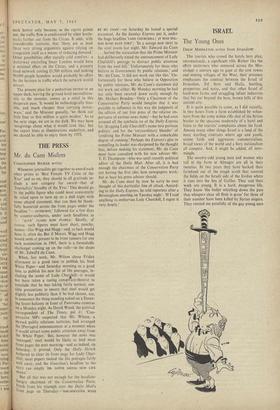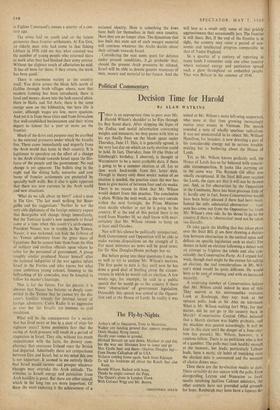ISRAEL The Young- Ones •
DREW MIDDLETON writes from Jerusalem:
The tourists who crowd the hotels here play, unconsciously, a significant role. Rather like the effete easterners who ventured across the Mis- sissippi a century ago to gape at the cow towns and mining villages of the West, their presence emphasises the contrast between the Israel of Jerusalem, Tel Aviv and Haifa, bustling, prosperous and noisy, and that other Israel of hard-won farms and struggling infant industries that lies out beyond the bare, brown hills of this ancient city.
It is quite possible to come, as I did recently, in two hours from a farm established by volun- teers from the army within rifle shot of the Syrian border to the spacious modernity of a hotel and listen to the tourists' complaints about the food. Among many other things Israel is a land of the most startling contrasts where age and youth, serene faith and aggressive commercialism, broad views of the world and a fiery nationalism all compete. And, it might be added, all inter- mingle.
The seventy-odd young men and women who toil at the farm at Almagor are all in their twenties. In two years they have hacked their farmland out of the rough scrub that covered the fields on the Israeli side of the Jordan where it runs into the Sea of Galilee. They and their work are young. It is a hard, dangerous life. They know 'the bullet whistling down the pass that whispers clear all flesh is grass' for three of their number have been killed by Syrian snipers. They remind me painfully of the gay young men in Fighter Command's messes a quarter of a cen- tury ago.
The stress laid on youth and on the future permeates these frontier settlements. At Ein Gev, an elderly man who had come to that fishing kibbutz in 1936 told me that what counted was the number of young people who returned there to work after they had finished their army service. Without the slightest touch of affectation he said, 'It has all been for them; if they return, the work has been good.'
There is enormous variety to the country itself. You drive across the bleak hills north of Galilee through Arab villages where, now that modern farming has been introduced, there is food and money, down into the lush coastal plain. Here in Haifa and Tel Aviv, there is the same energy seen on the kibbutzim, but here life is easier, although wages are low, more spacious. And yet it is from these cities and from Jerusalem that well-established businessmen and their wives depart to labour for a year or more on the frontier.
Much of the drive and purpose may be ascribed to the external pressures under which the Israelis live. These come immediately and urgently from the Arab world that hems in their country. It is legitimate to speculate on the effect of a change in the Arab altitude towards Israel upon the life- force of the people and the government. No real change is yet apparent. The bullets sing in the night and the dining halls, nurseries and cow barns of frontier settlements are protected by specially built walls. But it also is quite apparent that there are new currents in the Arab world and new situations.
'What do we talk about up here?' asked a man in Ein Gev. 'The last week nothing but Bour- guiba and his suggestions.' Neither he nor the very able diplomats of the foreign ministry expect that Bourguiba will change things immediately. But the Tunisian leader's new approach to Israel came at a time when this country's arch-enemy, President Nasser, was in trouble in the Yemen. Nasser, it was reckoned, can hide the failures of his Yemen adventure from the great mass of Egyptians. But he cannot hide them from the dlite of military and civilian officials upon whom he relies for the personnel of government. A group roughly similar produced Nasser himself after the national indignities of the war against infant Israel in the Forties and who knows but what some ambitious young colonel, listening to the bellyaching of his comrades, may be tempted to follow his master's footsteps.
That is for the future. For the present it is obvious that Nasser has become so deeply com- mitted in the Yemen that he cannot try the dic- tator's familiar remedy for internal unrest of foreign adventure. Cairo Radio is as aggressive as ever but the Israelis are immune to oral escalation.
What will be the consequences for a society that has lived more or less in a state of siege for eighteen years? Some pessimists fear that the easing of Arab pressure will result in a period of stagnation in Israel. They cite, without too much acquaintance with the facts, the drowsy com- placency that overcame Ireland once the British had departed. Admittedly there arc comparisons between Eire and Israel, but to my mind this one is not important. It seemed to me entirely likely that Israel would survive and prosper whatever changes may overtake the Arab attitude. The stimulus to Israeli energy and patriotism from Arab hostility is great. But there are other stimuli which in the long run are more important. Of these the most enduring is the achievement of a national identity. Here is something the Jews have built for themselves in their own country. Here they are no longer alien. The dynamism that has built this state out of such meagre material will continue whatever the Arabs decide -about their attitude towards Israel.
Considering the vast sums spent for defence under present conditions, it.is probable that, should the present Arab pressures be relaxed, Israel will be able to devote greater resources of men, money and material to her future. And she will lose as a result only some of that prickly aggressiveness that occasionally jars. The frontier is still there. But, if the end of the frontier is in sight, the country may enter a period of eco- nomic and intellectual progress comparable to that of Tudor England.
In a quarter of a century of reporting in many lands I remember only one other country where national energy and patriotism spread such a glow throughout an embattled people. That was Britain in the summer of 1940.



































 Previous page
Previous page